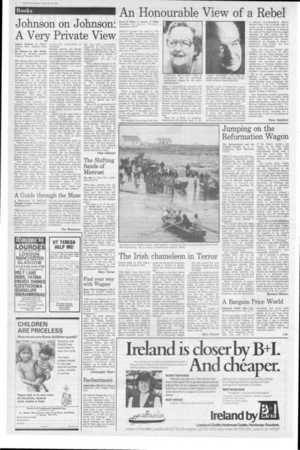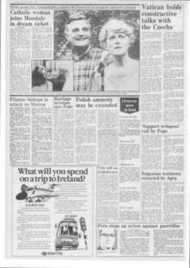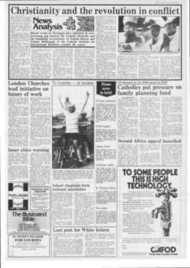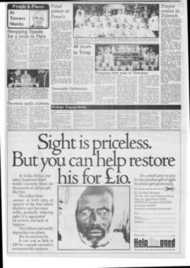Page 5, 20th July 1984
Page 5

Report an error
Noticed an error on this page?If you've noticed an error in this article please click here to report it.
Tags
Share
Related articles
‘muv’ Is The Unsung Hero Of The Great Mitford Saga
Low Life
Spiller Of Beans
Sunday Guessing Game
The Oldest (and Once The Best Paper) Of All
An Honourable View of a Rebel
/aces of Philip: A memoir of Philip Toynbee by Jessica Mitford, Heinemann, £9.95 PHILIP Toynbee was asked by The Times in 1980 to prepare an obituary of Jessica Mitford. The request prompted a sparkling correspondence between these two life-long friends, with Toynbee finally promising "Should you prefer it, write your own obit — about six hunted words — and I promise (nearly) not to alter one of them".
In the event, however, it was Jessica Mitford who was asked by The Observer to contribute a piece about her friend, the distinguished poet, novelist and literary critic, after his death in 1981.
Miss Mitford has now produced a memoir which makes no claims to be a biography. It is rather an intimate recollection based on nearly 50 years acquaintance with Philip Toynbee. She has been helped by his two wives, five children and a wide circle of friends and admirers, all of whom are quoted at length in various sections of the book to balance the views of the author herself.
There are obvious gaps in this memoir, as Miss Mitford is quick to point out. For instance Toynbee's divorce from his first wife Anne is passed over in a sentence. But that, it is revealed in the introduction, was the 'idea of Anne Wollheim herself. Having Tead Miss Mitford's account, she suggested that it be discarded in favour of the one sentence, "The following year she left Philip and married Richard Woliheim".
The character that emerges from these
pages is extraorinarily colourful and complex. Philip Toynbee was the son of Arnold Toynbee and the grandson of Professor Gilbert Murray. At the age of 15 he ran away from Rugby to join Esmond Romilly, Decca Mitford's first husband, in a new publication, Out of Bounds. Toynbee's participation in this venture came to an abrupt end when his mother reclaimed him, but his friendship with the Romillys lasted until Esmond's death in the Second World War.
There are a series of delightful reminiscences of evenings spent in the
Romilly's house in Rotherhithe Street, when Toynbee was continually called on by his hosts to defend the apparent contradiction of his membership of the Communist Party the was the first, and only, Communist to be elected President of the Oxford Union) with his socialising with wealthy debutantes.
After the war, Jessica Mitford and her second husband, Bob Treuhaft, moved to California, where they remained out of touch with Toynbee until the publication of his Friends Apart in 1954 — an affectionate memoir of Esmond and Jaspar Ridley. From thence forward a copious correspondence flowed between them. This is quoted from at length, as well as details of the visits by the Truehafts to England, to illustrate the events of Toynbee's life: his second marriage, to Sally Smith, his five children, (including Polly Toynbee, The Guardian columnist), his various publications, his attempts to found a commune, and finally his Late conversion to Christianity.
These last two are treated with considerable scepticism by Miss Mitford, but she counterbalances her accounts with those of Sally Toynbee and her children. There are also many friends who contribute their own recollections of Toynbee: Robert Kee, Ben Nicholson and Terry Kilmartin, on whose Books page in The Observer, roynbee's reviews appeared each week.
Of all his published works, Miss Mitford is most fascinated by the critically acclaimed Pantaloon series, which Toynbee never completed. She describes it as his "ultimate monument". However, this experiment in writing in verse never received the popular acclaim it deserved.
This fascinating memoir generously finishes with the views of others. David Astor writes that "Philip's love of people and loyalty to them was one of his most striking characteristics". The final impression left by the book is a picture of an outrageous, exuberant and much-loved person, searching for a practical way to live out his moral and political views.
Peter Stanford
blog comments powered by Disqus










